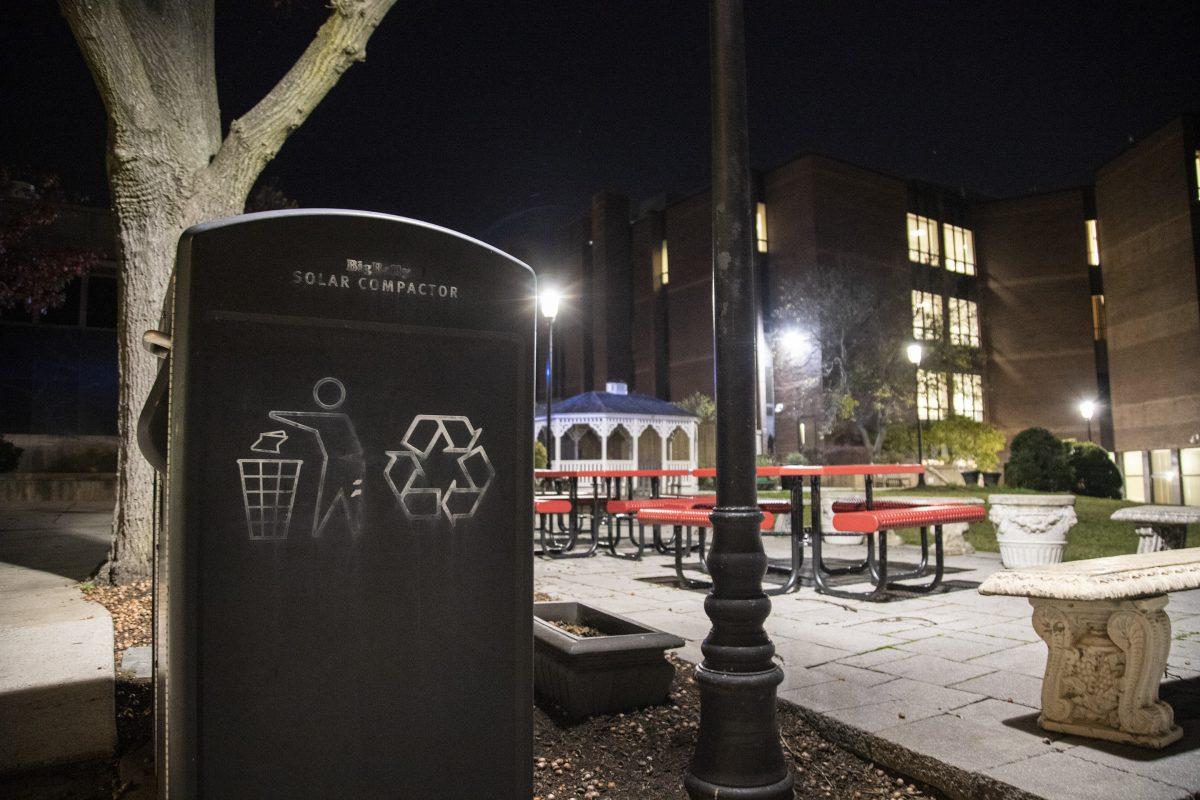The departments of economics, environmental science, history and political science hosted a panel on Oct. 29 in Doyle Banquet Hall during which professors discussed how climate change could allow individuals to help solve environmental problems.
Speakers at the Climate in Crisis panel urged students at St. Joe’s to be part of a solution. Corinne Bocci, Ph.D., assistant professor of economics, said if students make little changes in their daily lives, these will be very beneficial to the environment.
“There are tons of little things that they can do,” Bocci said. “Things like recycling plastic bottles, and when they go to the grocery store they should use fewer plastic bags. Little steps go a long way and if students are just a little more mindful, like keeping an ear out for news articles and how this relates to not only your life but someone else’s and how it relates to the world is helpful in and of itself.”
Deirdre Taft-Lockard ’20, co-president of the St. Joe’s Green Fund, which co-sponsored the Climate in Crisis panel, said The Green Fund promotes sustainability and environmental awareness along with trying to implement those behaviors on campus.
“Overall, The Green Fund is trying to expand upon sustainability and environmental awareness on campus,” Taft-Lockard said. “So far, [St. Joe’s] has been very helpful about trying to implement these procedures.”
Cassidy Kovisto ’21, a coordinator for Common Grounds, which was also a sponsor for this panel, hoped to facilitate this difficult conversation on how our climate is in crisis and how we can change the future of St. Joe’s.
“[It was important] to have an informative and educational discussion concerning the current state that the world is in,” Kovisto said. “[Also], there needs to be more sustainability on campus and this panel was able to be a platform for students and faculty to communicate how they hope to see the future of SJU change.”
Taft-Lockard said there are a number of ways students and faculty can become more environmentally sustainable, from eliminating plastic to attending informative panels.
“[Students and faculty should] limit or stop using single use plastic bottles and use a reusable bottle, especially since [St. Joe’s] “Laudato Si,” has a lot of water bottle fillers around campus,” Taft-Lockard said. “Eliminate using plastic bags from the grocery stores. Instead, try and bring a reusable bag, try to reduce food waste, and in the dining hall take only what you think you can eat.”
Clint Springer, Ph.D., director of environmental science and sustainability studies, said a group of faculty was unsuccessful in lobbying the university administration to put resources into more sustainable environmental efforts.
“I think it’s a shame,” Springer said. “Other universities have a chief sustainability officer, or they have someone whose job is it to make the university more sustainable in everything, not just programming and curricular things, but in everything. We don’t have anything like that, and it’s very frustrating.”
Springer said students need to make their voices heard, especially since St. Joe’s is a Jesuit school and Pope Francis wrote about climate change and environmental justice in his 2015 encyclical “Laudato Si,” meaning “Praise Be to You.”
“You all should be showing up [at Regis Hall] every Friday for the rest of the semester telling them to get their asses in gear, because this is ridiculous,” Springer said. “[Climate change] has gotten worse way worse, we’ve done nothing globally, we’ve done nothing domestically, [and] we’re currently rolling back things that are exacerbating the problem even further.”
Emily Sokolowski ’20 said she was surprised by the graphs panelist shared that showed the effects that climate change is having on land and migration.
“[The panel is] trying to get a cohort of students together to put more pressure on the university to do more things for environmental justice on campus and everything,”
Sokoloski said. “St. Joe’s could do so much [more], especially listening to the faculty [about] using more renewable resources.”













































